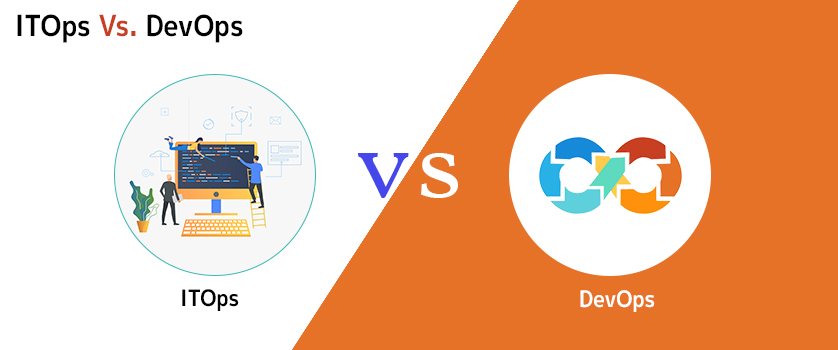


ITOps is an acronym for Information Technology operations, which comprises all activities that form a crucial part of any software development process. IT operations can be broadly classified into a network, server and device management, security. The responsibility of ITops varies across tasks, such as installing and maintaining network infrastructure, both internal and external, monitoring security compliance measures, setting up devices and closely monitoring them, configuring, and maintaining the infrastructure, and so on.
The DevOps process comprises the development and testing phases, managed by developers and testers in addition to deployment, operations, and maintenance activities managed by the operations team. DevOps emphasizes continuous integration and development (CI/CD).
Operations have co-existed from time immemorial or we can say ever since the concept of Information Technology emerged. It aims to assist in strong collaboration with the IT team to help achieve overall business objectives, as well as help teams comply with their project requirements. The mission of any business is to meet the market demands or the end-user requirements within an allocated time frame.
We try to summarize the classification of IT functions as follows:
The IT operations department is entrusted with the responsibility to handle the installation and supervision of the network infrastructure that facilitates operational efficiency. The primary responsibility of any IT operations team is to ensure compliance of organizational security parameters with the teams by adopting mechanisms, such as two-factor authentication, VPN, and so on. Network security is of foremost importance for any organization, and therefore, compliance with the necessary protocols is crucial to face the challenges pertaining to cyber threats.
This area revolves around dealing with the physical infrastructural requirements such as data loss due to disaster, wear, and tear of equipment, and so on. The operations team is thus responsible to look after data backups on a regular basis.
The IT operation team is responsible for managing user’s device storage by complying with the required memory, backup, and necessary components that are needed to keep a device working.
The above points bring out the importance of the existence of an IT operations team, which forms the backbone of any organization’s software-related functions. Hence, one can easily conclude that the coexistence of IT and operations is not naïve, and therefore understand that it requires strong teamwork to succeed in the mission.
DevOps is a terminology that specifically aims to target the teamwork between software development and operations teams. Although the difference is very subtle with respect to operations acting as a backbone for the entire IT team and software development team. We will delve deeper into the differences in the later section.
In recent times, with the emergence of Agile, DevOps has emerged as the new incumbent in the world of information technology. We can say that information technology is an umbrella term that comprises sub-functions, each having its own contribution to achieving deliverables.
DevOps is one such addition to the gamut of information technology. It has a host of advantages to offer to the teams working towards meeting continuous integration and delivery.
Some of the key highlights are listed as follows:
If no IT operations exist, can our DevOps team sustain as efficiently as before?
Well, an organization can derive benefits from cloud technology and minimize the cost of retaining resources that assist in attending to the necessary activities such as continuous integration and development.
NoOps can thus add some potential benefits in the DevOps environment:
Thus, the IT operations team has the benefit of extending their expertise towards more technological advancements. However, there’s always a dilemma and debate over whether total elimination of resources would be a wise thing or not. The benefits of emerging technologies can very well be used for improving the structure of our work. But, it can also help understand the importance of other components that might be needed for supporting the operations, such as the IT operations team in this context.
Extending our understanding of ITOps, we can clearly say that it is the foundation for DevOps and NoOps.
ITOps can be subdivided into the following two categories:
SecOps simply deals with security and operations activities or we can say it is a collaboration between IT security and operations teams. With an increase in risks pertaining to cybersecurity, organizations must aim to keep their infrastructure and data secured.
CloudOps is the integration of best practices and procedures to carry on software development activities on cloud-based platforms, effectively. It is an approach that combines DevOps and ITOps to bridge the gap between the two groups.
Operations is an area that circumscribes the need to worry about how the system should work, the infrastructure feasibility, and various other components required to run a system efficiently by the DevOps team. The onus of worrying about such nitty-gritty lies on the IT operations team, which handles system downtime, various system update requirements to bridge the gaps between hardware and software requirements. Each activity, software development activities and infrastructural needs, are crucial and quite a challenge to carry on. Therefore, each team has a diverse set of contributions to make towards achieving the customer requirements and the dynamic market trends.
Operations in Information Technology can be considered the backbone for carrying out the CI/CD components of DevOps.